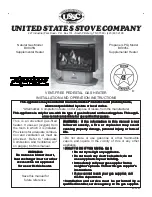
NEVER LEAVE HEATER UNATTENDED WHILE BURNING,
CONNECTED TO A POWER SOURCE, OR WHILE
CONNECTED TO A FUEL SOURCE
© 2015, Pinnacle Products International, Inc.
Convection Heater User's Manual
®
Operation
Propane Supply / Information:
Propane (LP)
This heater is not supplied with a propane cylinder.
Use only an approved propane cylinder.
LP Characteristics
–
Flammable, explosive under pressure, heavier
than air and pools in low areas.
–
In its natural state, propane has no odor, but
for your safety an odor that smells like rotten
cabbage has been added.
–
Contact of propane (LP) gas with the skin can
cause freeze burns.
–
Heater is manufactured for use with propane
gas only. DO NOT attempt to convert to any
other gas. Such modifications are dangerous
and will void the warranty.
–
When heater is not in use, LP Cylinder must be
turned OFF.
–
Be sure that the LP Cylinder is located on a
level and stable surface.
–
DO NOT use this heater in a basement or
below ground level. Propane is heavier than
air and will always seek the lowest level. If you
suspect a leak, shut off the valve at the LP
Cylinder immediately.
The Propane (LP) cylinder must also be
equipped with the following
–
A collar to protect the gas valve.
–
A shut-off valve terminating a LP cylinder valve
outlet as specified in the American National
Standard for Compressed Gas Cylinder Valve
Outlets and Inlets Connections.
–
A safety relief valve having direct
communications with the vapor space of the LP
cylinder.
–
The heater must operate on vapor withdrawal
from the operating cylinder.
The amount of Propane (LP) used with this
heater varies. Both factors are
–
The amount of gas in the cylinder of LP.
–
The temperature of the LP tank and its
surroundings.
–
Always keep LP cylinder fastened and upright.
–
Avoid tipping the LP cylinder on its side when
connected to a regulator, since this may
cause damage to diaphragm in the regulator.
–
Handle valves with care.
–
Never connect an unregulated LP cylinder to
a construction heater.
–
DO NOT subject LP cylinder to excessive heat.
–
Tightly close the gas shutoff valve on the LP
cylinder after each use.
–
All fittings must be protected when
disconnected from the LP cylinder.
–
Never store an LP cylinder inside a building or
in the vicinity of an gas burning appliances.
Average Temp
(ºF)
80V-LPC-A
100 lb. cylinder
200V-LPC-A
100 lb. cylinder
32º
1
2
20º
1
2
10º
2
3
0º
2
3
-10º
2
3
-20º
2
3
The table above shows the minimum number of 100 lb. LP
cylinders required in cold weather. Your local LP dealer will
help you select the proper LP supply System
Propane is safe to use when
properly handled. Careless
handling of the LP cylinder could result in a
fire and or an explosion.
CAUTION
The disconnected tank must
never be stored in a building,
garage or any other enclosed area.
CAUTION
6








































